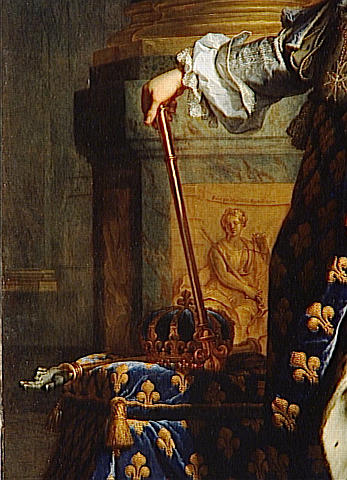Wednesday, June 9

Continuing the Royal Theme
The inexhaustibly-fascinating website heraldica.org offers some unusual tidbits on the French monarchy, including the origin of the design of France's crown as stemming from her titular legal claim on the defunct Byzantine Empire after the nephew of Constantine IX, Andreas Paleologue (1453-1502), signed away his rights to Charles VIII in 1494. Even more intriguing is this passage, on national anthems and the Liturgy of the Hours:
The French monarchy did not have [a national] anthem [...] in the modern sense, but there was a responsory [...] said or sung in Catholic churches, called the Domine fac salvum. The text comes from Psalms 19:10 in the Vulgate: Domine salvum fac regem et exaudi nos in die qua invocaverimus te. (Lord save the king and hear us in the day when we shall call you.)Incidentally, there really was a St. Napoleon--he wasn't simply a figment of Old Boney's somewhat religiously-confused imagination. Also known as Neopolus of Alexandria, he was tortured to death under the reign of Diocletian, personifying those virtues of humility and faithfulness which his excommunicated namesake so flamboyantly lacked. This didn't stop post-Restoration Bonapartists from displaying images of the (presumably non-military) saint as a warrior on horseback with, most extraordinarily, the Corsican ogre's mug where the martyr's face ought to have been.
[...] This was customarily sung on Sunday at Matins [...]. There was a Gregorian plainchant for that psalm [...]. Many French composers wrote motets for those verses, and there are several settings by Lully for example. The French almanach Quid claims that a version of this responsory composed in the late 17th c. for Mme de Maintenon later became God Save the King, but this may be the French mania to claim to have invented everything before the English.
Under Napoleon the responsory was changed to Domine fac salvum imperatorem, and then back to regem in 1814, then in 1830 to regem Philippum (lest the Lord be confused about which king to save), then to rem publicam in 1848, and back to imperatorem in 1852. It's like changing names of streets. Charles Gounod composed a splendid march to the words for Napoleon III, which Harvard still uses, I am told, in its graduation exercises, but with praesem nostrum substituted, when the University president arrives. [...]
Under the French Bourbon monarchy, the feast days with the most dynastic significance were the Assumption (because of Louis XIII's dedication to the Virgin in the 1630s) and the feast day of Saint Louis IX on August 25. By decree of 19 Feb 1806, Napoleon I established two holidays: the feast day of Saint Napoleon on August 15 (coincidentally, the Assumption) which happened to be his birthday as well as the date of signing of the Concordate of 1802, and the anniversary of the coronation as well as the battle of Austerlitz on 2 December. On both occasions, speeches were to be made by priests and Te Deums sung, in the presence of civil and military authorities. Processions were also required on August 15. The date of 2 December is still important for some institutions linked to Napoleon: in particular, in the French Army Academy (Saint-Cyr) where it is called Deux-S (each month of the school year being named after a letter in the name of the battle).












